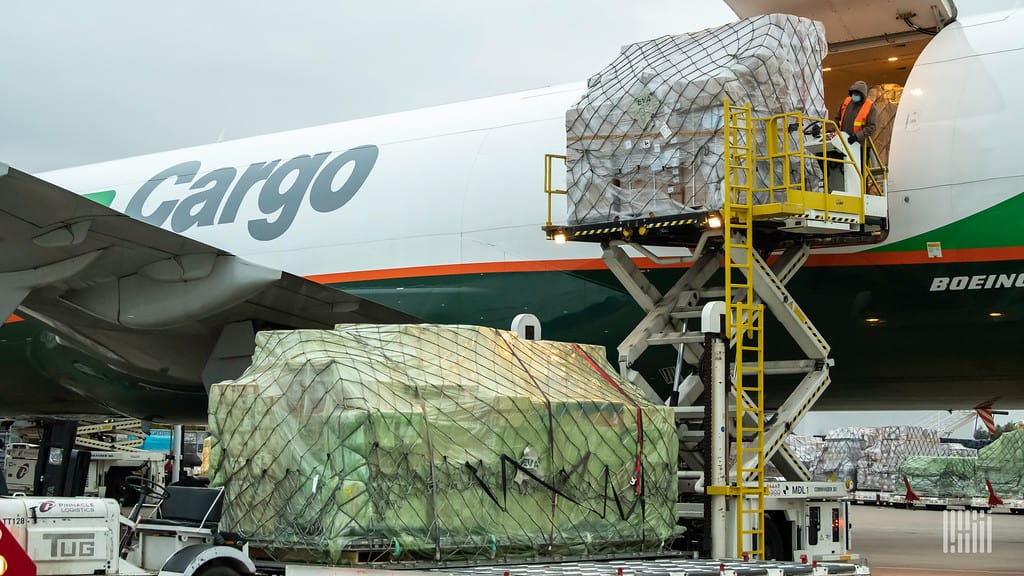Expeditors International managed to beat Wall Street consensus and make more money than last year’s first quarter despite a cyberattack in February and a notable drop in the amount of tonnage the company handled.
Expeditors (NASDAQ: EXPD), a 3PL that moves freight via air and ocean, earned $2.05 per share for the first quarter, which was 26 cents better than consensus forecast, according to Seeking Alpha. Revenue of $4.7 billion was better than consensus by $440 million.
The net income was up from first-quarter 2021 earnings per share of $1.67.
This occurred even as the company, in its quarterly earnings statement, spelled out the financial expenses it was hit by as a result of the cyberattack. Expeditors said it incurred approximately $40 million in incremental demurrage charges that are a direct hit to the company. It also said its costs to fix a bevy of the problems created by the cyberattack — “investigation, recovery and remediation, including costs to recover its operational and accounting systems” — were estimated at $20 million. However, Expeditors added that it does not expect to incur significant capital expenses as a result of the cyberattack.
But there may be other costs coming. Some of them are specific, according to the Expeditors release: “third-party expenses, incremental information services costs, legal fees or indemnities to customers or business partners.” But the costs that are harder to measure, the company said, are related to the loss of volume to other logistic companies, “resulting in lower shipment volumes in the first quarter for which the financial impact on revenues and operating income cannot be quantified.”
The bottom line? “The company is unable to estimate the ultimate direct and indirect financial impacts of this cyberattack,” Expeditors said.
“Our people performed magnificently and we are proud of the financial results, especially considering the additional expenses and reduced volumes as a result of the cyberattack,” Jeffrey Musser, Expeditors’ CEO, said in the company’s prepared earnings statement. “We are extremely appreciative that the vast majority of our customers chose to keep their business with us while we worked to resolve the impact of the cyberattack.”
The attack hit in the last week of February. The impact can be seen in the tonnage figures provided by Expeditors. While airfreight tonnage, measured in kilos, was up 10% in January, it was down 11% in February and 45% for March, for a full-quarter decrease of 18% compared to the corresponding quarter of 2021. Ocean freight tonnage was down 1% in January, flat in February but down 8% for March, resulting in an overall quarterly decline of 3%.
In reviewing how the company managed to perform relatively strongly despite a big loss of business due to the cyberattack, Musser said the general supply chain squeeze was a significant tailwind. “Rates remained elevated due to ongoing supply chain bottlenecks and capacity constraints, while tonnage and volumes declined principally as a result of the cyberattack,” he said. “Airfreight continues to be impacted by the extreme imbalance between capacity and demand, particularly with exports out of Asia.”
The airfreight business benefited from “the severe disruptions on the seas,” Musser said. “Ocean volumes, in turn, continued to be hampered by port congestion due to labor and equipment shortages, which disrupted sailing schedules and kept rates well above historical norms. None of the issues in the air, on the water or at the ports have appreciably improved or are likely to in 2022.”
Expeditors does not conduct an earnings call with analysts. Its stock rose 27.8% last year, but is down 9.47% in the last three months. Expeditors is also a “dividend aristocrat,” defined as a company that has had an annual increase in its dividend for 25 consecutive years. It is the only logistics company with that designation.
The company’s improved net earnings came as its revenues rose 46%, to $4.66 billion, up from $3.2 billion. The cost of transportation rose more, climbing 56% to $3.5 billion. But the other key expense category came in significantly below the increase in revenue: Salaries and other expenses were up 21%. The end result was a 20% increase in operating income and the 21% jump in net earnings attributable to shareholders.
More articles by John Kingston
Saia latest trucking company with record Q1, more terminal openings ahead
E2open closes 1st public year with revenue beat, higher EBITDA











